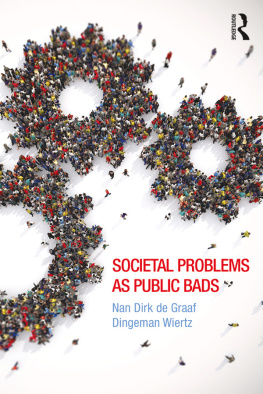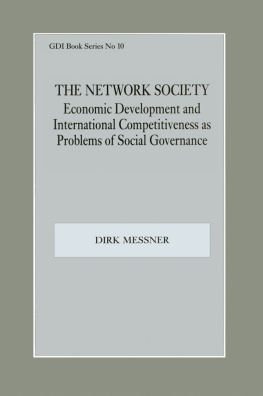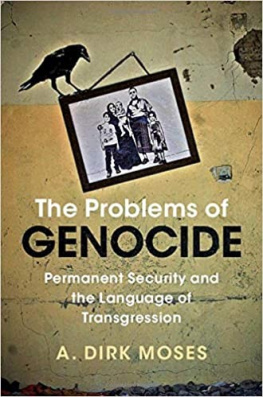SOCIETAL PROBLEMS AS PUBLIC BADS
Corruption, crime, economic inequality, religious fundamentalism, financial crises, environmental degradation, population ageing, gender inequality, large-scale migration... This book tackles many of the most pressing problems facing societies today. The authors demonstrate that similar social mechanisms lie behind many of these seemingly disparate problems. Indeed, many societal problems can be traced back to behaviours that are perfectly rational and often well-intended from an individual perspective. Yet, taken together these behaviours can paradoxically give rise to unintended and undesirable outcomes at the society level.
In addition to addressing the causes of societal problems, the book explains why some problems rank higher on the public agenda than others. Moreover, it is shown how government intervention may sometimes provide a cure, yet other times exacerbate existing problems or create new problems of its own. This book includes an extensive amount of data on trends and geographic variation in the prevalence of different problems, as well as telling examples both recent and historical from a variety of countries to support its key arguments.
Employing a bold multidisciplinary approach, the authors draw on insights from across the social sciences, including sociology, economics, anthropology, criminology, and psychology. Throughout the book, students are introduced to analytical concepts such as free-riding, herding behaviour, principal-agent relations and moral hazard. These concepts are essential tools for better understanding the roots of many societal problems that regularly make headlines in the news. This improved understanding will, in turn, be critical for ultimately finding solutions to these problems.
Nan Dirk de Graaf is an Official Fellow at Nuffield College and Professor of Sociology at the University of Oxford. His research interests include social stratification especially educational attainment and how social mobility affects political preferences, health and attitudes, sociology of religion, pro-social behaviour, and political sociology.
Dingeman Wiertz is a Lecturer in Social Science and British Academy Postdoctoral Fellow at University College London. Having received training in economics as well as sociology, his research interests include civic engagement, inter-ethnic relations, social networks, economic hardship, political attitudes, school choice, and residential segregation.
SOCIETAL PROBLEMS
AS PUBLIC BADS
Nan Dirk de Graaf and Dingeman Wiertz
First published 2019
by Routledge
2 Park Square, Milton Park, Abingdon, Oxon OX14 4RN
and by Routledge
52 Vanderbilt Avenue, New York, NY 10017
Routledge is an imprint of the Taylor & Francis Group, an informa business
2019 Nan Dirk de Graaf and Dingeman Wiertz
The right of Nan Dirk de Graaf and Dingeman Wiertz to be identified as authors of this work has been asserted by them in accordance with sections 77 and 78 of the Copyright, Designs and Patents Act 1988.
All rights reserved. No part of this book may be reprinted or reproduced or utilised in any form or by any electronic, mechanical, or other means, now known or hereafter invented, including photocopying and recording, or in any information storage or retrieval system, without permission in writing from the publishers.
Trademark notice : Product or corporate names may be trademarks or registered trademarks, and are used only for identification and explanation without intent to infringe.
British Library Cataloguing-in-Publication Data
A catalogue record for this book is available from the British Library
Library of Congress Cataloging-in-Publication Data
Names: Graaf, N. D. de. (Nan Dirk), author. | Wiertz, Dingeman, 1988- author.
Title: Societal problems as public bads / Nan Dirk de Graaf and Dingeman Wiertz.
Description: Abingdon, Oxon ; New York, NY : Routledge, 2019. | Includes bibliographical references and index.
Identifiers: LCCN 2018060678| ISBN 9781138480209 (hardback) | ISBN 9781138480216 (pbk.) | ISBN 9781351063463 (ebook)
Subjects: LCSH: Social problems. | Social policy.
Classification: LCC HN18.3 .G73 2019 | DDC 306dc23
LC record available at https://lccn.loc.gov/2018060678
ISBN: 978-1-138-48020-9 (hbk)
ISBN: 978-1-138-48021-6 (pbk)
ISBN: 978-1-351-06346-3 (ebk)
Typeset in Sabon
by Swales & Willis Ltd, Exeter, Devon, UK
Figures
Economic inequality, environmental degradation, large-scale migration, crime, corruption, religious fundamentalism, financial crises, gender inequality, population ageing... In this book we tackle several of the most pressing problems facing societies today. In particular, we aim to improve readers understanding of the features, causes and implications of these problems.
Crucially, we do not analyse these problems through the lens of a particular discipline, but rather employ a multidisciplinary approach, drawing on insights from across the social sciences, including sociology, economics, psychology, criminology and anthropology. We argue that such a multidisciplinary perspective is indispensable for gaining a comprehensive appreciation of how these problems are embedded in society. Different disciplines have different things to say in this regard and, therefore, it is critical to let them speak to and complement one another. This strongly reflects our philosophy in relation to social science, whereby the empirical realities of key societal problems take centre stage, with the insights from various disciplines being servants to a better understanding of these problems.
A fundamental element of our analytical approach is that we relate any observed society-level phenomena to the individual-level behaviours underlying them. We consider how society-level circumstances shape the behaviour of individual actors in concrete situations, and how the aggregation of these individual-level actions subsequently give rise to society-level outcomes. In doing so, we demonstrate that similar social mechanisms lie behind seemingly disparate societal problems. We especially highlight that many societal problems can be traced back to behaviours that are perfectly rational and often well-intended from an individual perspective. Yet, taken together these individual-level behaviours can paradoxically give rise to unintended and undesirable societal outcomes.
Throughout the book we provide many telling examples of such dynamics, whether related to the origins of environmental problems, the persistence of corruption, or the unfolding of stock market crashes. Moreover, we show how government intervention may sometimes provide a cure to societal problems, yet other times exacerbate existing problems or create new problems of its own. We illustrate our discussions with an extensive amount of figures and tables on trends and cross-country variation in the prevalence of different problems. Furthermore, we introduce readers to analytical concepts such as free-riding, herding behaviour, principal-agent relations, moral hazard, self-fulfilling prophecies and critical mass models. As will become clear, these concepts are essential tools for better understanding the roots of societal problems that continually make headlines in the news and, ultimately, for finding solutions to them.
This book is the result of a long process, which goes back to when Nan Dirk, together with Willem Wolters, started teaching on societal problems in the early 1990s. Based on their teaching they wrote a book in Dutch: Maatschappelijke Problemen (Societal Problems), published with Boom in 2005. Nevertheless, Nan Dirk always maintained the idea to write another book on this topic for a broader international audience. These plans gained momentum after Dingeman arrived in Oxford in 2010, driven by a similar passion for understanding societal problems and equally committed to a multidisciplinary social science approach.














